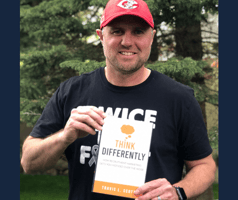Want to Build Your Personal Brand? Focus on These 3 Things First

The topic of building your personal brand isn’t a new one, and I’m sure it’s something you hear a lot about.
You may be asking yourself, “Do I really need to develop my personal brand?” and my answer would be, “not really.”
It’s up to you and what your professional goals are. I think the thought of building a personal brand conjures up thoughts of becoming an ‘expert’ in some area and includes writing and public speaking.
Those things can be scary to people, but they’re also not all-inclusive to having a personal brand.
You can do many things, but the one thing you must do is become visible in some way to those you seek to serve.
Whether you decide to make a concerted effort to level up your personal brand or you want to become more visible to those you matter most to, the only two things you should focus on are:
- Who are you?
- What do you do?
- Who are you for?
Who are you?
When you think about who you are as a person (and a consultant, employee, or business), there are three core things to consider: values, experience, and interests.
Often, this is lost on people when they decide to start a business or change companies. I’ve made the mistake of overlooking this in the past – not once, but several times.
When you’re first starting a business or looking for a new job, you’re eager to bring in revenue and land clients. When it comes to a new job, you may want a challenge, a change in scenery, and maybe a bump in your salary.
You can become so eager that you don’t take the time to understand who you are and how these clients (or the companies you’re interviewing with) align with your values, experience, and interests.
This is a critical oversight. If your values don’t align, it’s not going to work out, no matter how hard you try. You won’t be happy, and that’s something I can guarantee.
If your experience doesn’t align, it’s not a deal-breaker, but the project or role will be more difficult early on, and there’s a chance you’re unable to ship the final product or contribute the way you would like- or that your client or manager expects.
Aligning a project, role, or company to your interests could seem like a ‘nice to have,’ but in my opinion, it’s essential.
If you are interested in the products or services that your company or the client you’re working with sells or the market they’re in, you’re going to be more energized around the work you’re doing. You’ll be more into and willing to go the ‘extra mile’ when you need to. Overall, you’ll just be happier to get up every day, and there’s a tremendous amount of value in that.
We only live once, so why waste your time and happiness on something that isn’t fun and you’re not interested in (if you have a choice)?
What do you do?
This is the core of who you are as a professional. It’s also the question you get asked most often when you meet someone new. It could also be rephrased as “what’s it for.” This means, whatever it is you’re providing as a service- whether it’s coaching, marketing, consulting, etc. – what is it designed to do? How will it help solve a problem someone has?
What skills and experience do you have that you can share with others?
What do you know that others don’t but want to know?
As your inner voice tries to talk you out of it, you’re going to tell yourself that what you have to talk about is already being said and that there are people who know more about these topics than you do.
And, you’re right. These things have been talked about before. But, not by you.
There’s also no doubt that other people know more than you do. But, they also started where you’re at now - maybe even with less knowledge and experience. Conversely, there are also likely more people who don’t know what you know. And they want to know.
When thinking about what you do, don’t fall into the trap of putting yourself in a box. You may be surprised about the depth and breadth of the things you can pull in that make you and your experience unique.
Who are you for?
If you walk away from reading this with only one thing, that one thing should be that you aren’t for everyone - and that’s OK. In fact, it’s great. Because being for everyone has never been done before.
The other thing to remember is there are people out there who need and want to hear your message and the fact that you may not have as much experience or the depth of knowledge as other people may actually be to your benefit. That’s because the more you begin to know and the further away you become from those just starting out, the more difficult it can be to explain things in terms that are understandable to someone starting out.
That makes you the perfect person to deliver the message you have to tell.
Also, when you start to think about the people who may know more than you, you have to understand that you’re not for them. You’re not going to talk about anything they likely don’t know. You’re for the people who don’t know what you know. I can’t stress this enough.
Lastly, who are the people that need and want to hear what you have to say? Where do they hang out? What did you need to know when you first started out? That’s what they need to know and are in search of.
That’s it. If you nail these two things down, you’re 80% to where you need to be toward building and growing your personal brand. Knowing these two things will make it easy to describe yourself to others in your LinkedIn profile and in conversations - online and offline. Most importantly, you will be better able to provide real value to the small (but growing) audience who wants to hear what you have to share.
</div<></figure</div
-1.png?width=500&height=125&name=Website%20Logo%20-%20400x100%20(transparent%20background)-1.png)


